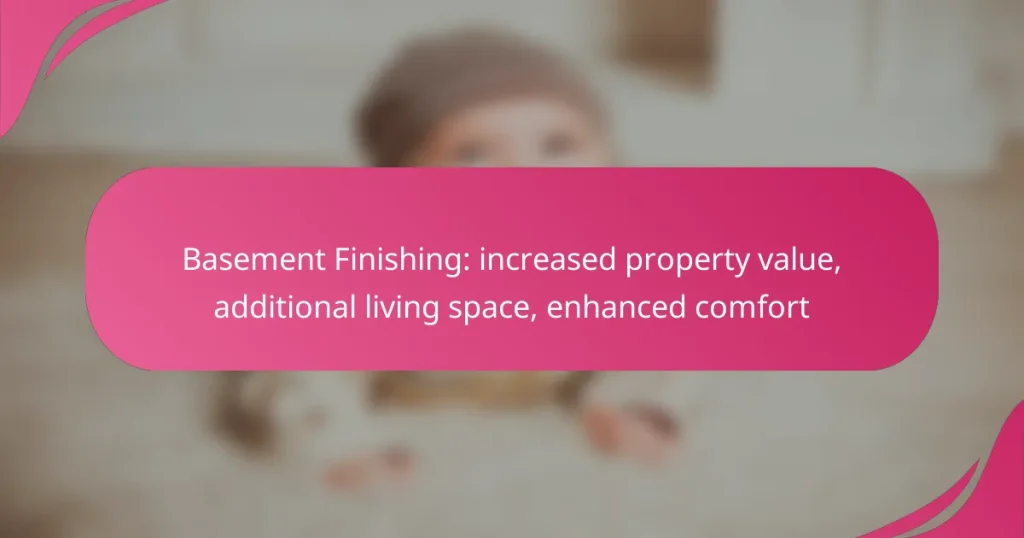Finishing a basement is a smart investment that can significantly increase property value by transforming unused space into functional living areas. This process not only adds additional square footage but also enhances comfort and appeal, making homes more attractive to potential buyers and renters.
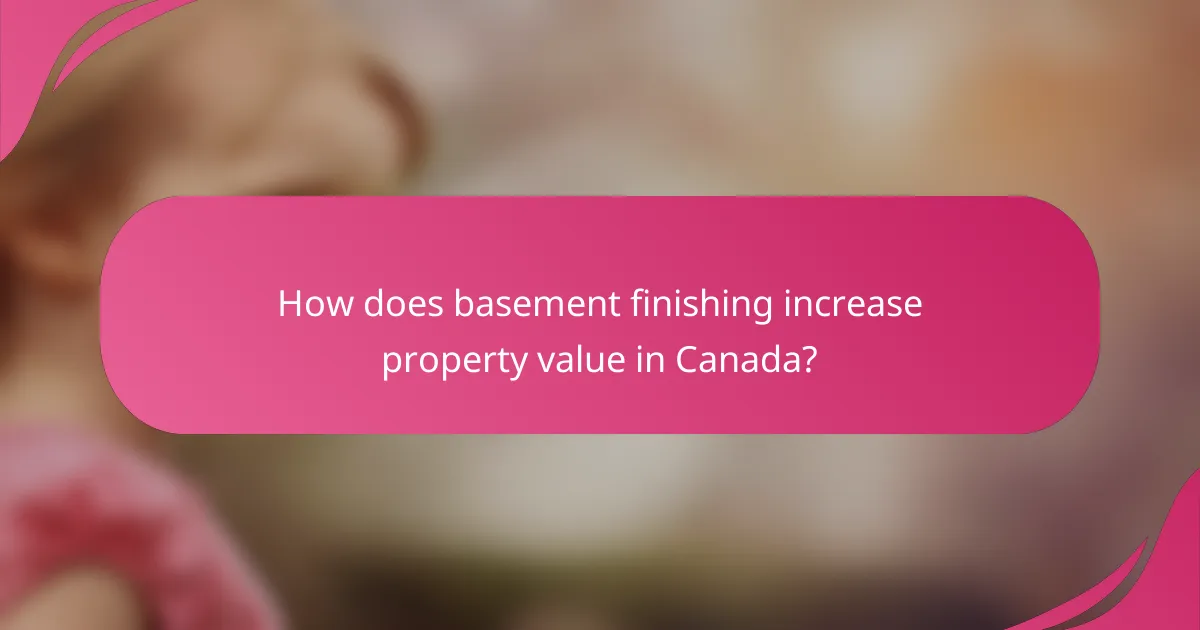
How does basement finishing increase property value in Canada?
Basement finishing significantly boosts property value in Canada by transforming unused space into functional living areas. This enhancement not only increases the overall square footage but also makes homes more appealing to potential buyers and renters.
Increased market appeal
Finishing a basement adds valuable living space that can cater to various needs, such as a family room, home office, or guest suite. This versatility makes the property more attractive to a broader range of buyers, enhancing its market appeal. In competitive real estate markets, homes with finished basements often stand out, leading to quicker sales.
Higher resale prices
A finished basement can increase a home’s resale price by a notable margin, often ranging from 10% to 20% depending on the quality of the finish and local market conditions. Buyers are typically willing to pay a premium for homes that offer additional livable space, as it reduces their need for renovations. Investing in quality materials and design can yield a higher return on investment when selling.
Attractive rental opportunities
In cities with high rental demand, a finished basement can provide an excellent opportunity for generating rental income. Homeowners can create a separate living unit, which can be rented out to tenants, thus offsetting mortgage costs. This additional income stream can make properties more appealing to investors looking for multi-family options.
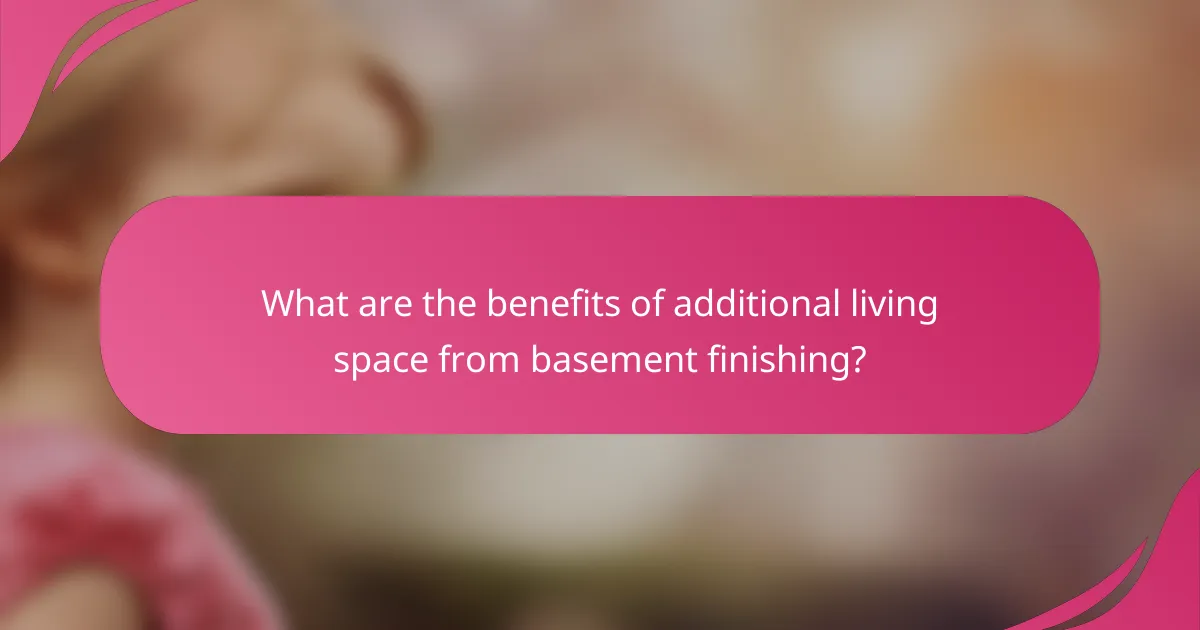
What are the benefits of additional living space from basement finishing?
Finishing a basement offers significant benefits, including increased property value, enhanced comfort, and the creation of additional living space. This transformation can lead to a more functional home while also providing potential financial returns when selling the property.
Extra bedrooms or guest suites
Converting a basement into extra bedrooms or guest suites can significantly enhance the utility of your home. This additional space can accommodate family members, friends, or even renters, making it a versatile option for homeowners. Depending on local regulations, you may need to ensure proper egress windows and ventilation for safety and comfort.
When planning for extra bedrooms, consider the layout and design to maximize space. Aim for a minimum of 70 square feet per bedroom to meet most local building codes. Furnishing these rooms with essentials like beds, storage, and lighting can create inviting spaces.
Home office or gym potential
A finished basement can serve as an ideal home office or gym, providing a dedicated area away from the main living spaces. This separation can enhance focus and productivity for work or fitness routines. With the rise of remote work, having a functional office space can also increase your home’s appeal to potential buyers.
For a home gym, consider installing rubber flooring and adequate lighting to create an inviting workout environment. Ensure there is enough space for equipment and movement, typically around 100 square feet for basic setups. A well-designed office should include good lighting, ergonomic furniture, and soundproofing if possible.
Entertainment areas
Transforming your basement into an entertainment area can significantly enhance your home’s livability. This space can be designed for movie nights, game rooms, or social gatherings, making it a focal point for family and friends. Incorporating features like a wet bar, home theater system, or pool table can elevate the experience.
When designing an entertainment area, consider the layout to ensure ample seating and flow. A common recommendation is to allocate at least 200 square feet for a comfortable setup. Adding soundproofing materials can help minimize noise disturbance to the rest of the house, ensuring everyone enjoys their activities without interruption.
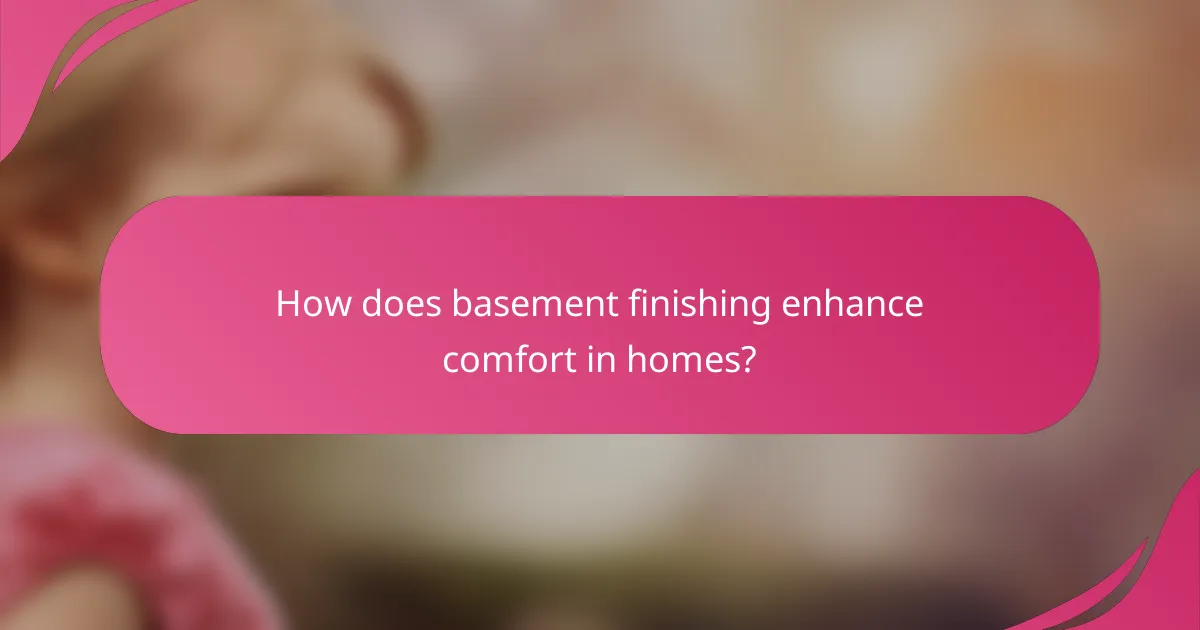
How does basement finishing enhance comfort in homes?
Basement finishing significantly enhances comfort in homes by transforming an often underutilized space into a cozy and functional area. This process not only improves the overall livability but also contributes to a more pleasant indoor environment.
Improved insulation and energy efficiency
Finishing a basement typically involves adding insulation, which can greatly improve energy efficiency. Proper insulation helps maintain a consistent temperature, reducing heating and cooling costs by preventing drafts and heat loss.
Homeowners can expect energy savings of around 10-20% on their utility bills after finishing their basements, depending on the quality of insulation used. Using materials that meet local energy codes can further enhance these benefits.
Better climate control
With a finished basement, climate control becomes more effective. Installing heating and cooling systems specifically for this space allows homeowners to regulate temperatures, ensuring comfort throughout the year.
Additionally, incorporating dehumidifiers can help manage moisture levels, preventing mold growth and improving air quality. This is particularly important in regions with high humidity, where unfinished basements can become damp and uncomfortable.
Personalized design options
Finishing a basement allows homeowners to customize the space according to their preferences, enhancing comfort. Options range from cozy family rooms to functional home offices, tailored to fit individual needs and lifestyles.
Choosing the right materials, colors, and layouts can create an inviting atmosphere. Homeowners should consider factors like lighting, furniture arrangement, and soundproofing to maximize comfort and usability in their newly finished basements.

What are the costs associated with basement finishing in Canada?
The costs of basement finishing in Canada can vary significantly based on factors such as size, materials, and design choices. Generally, homeowners should expect to invest several thousand to tens of thousands of Canadian dollars to transform an unfinished basement into a functional living space.
Average renovation costs
The average cost for basement finishing in Canada typically ranges from CAD 20,000 to CAD 50,000. This estimate includes labor, materials, and permits, but can fluctuate based on the complexity of the project and local labor rates. For high-end finishes or larger spaces, costs may exceed CAD 60,000.
Homeowners should consider obtaining multiple quotes from contractors to ensure competitive pricing. It’s also wise to budget an additional 10-15% for unexpected expenses that may arise during the renovation process.
Cost breakdown by materials
Material choices significantly impact the overall cost of basement finishing. Common materials include drywall, flooring, insulation, and fixtures. For example, basic drywall installation may cost around CAD 1.50 to CAD 3.00 per square foot, while high-quality flooring options like hardwood can range from CAD 5.00 to CAD 15.00 per square foot.
Additionally, plumbing and electrical work can add to the total expenses. Basic plumbing installation might start at CAD 1,000, while electrical upgrades could range from CAD 1,500 to CAD 3,000, depending on the complexity and local codes.
Financing options available
Homeowners in Canada have several financing options for basement finishing projects. Personal loans, home equity lines of credit (HELOC), and renovation mortgages are popular choices. A HELOC allows homeowners to borrow against their home’s equity, often at lower interest rates compared to unsecured loans.
Additionally, some government programs may offer grants or incentives for energy-efficient renovations. It’s advisable to research local options and consult with financial institutions to find the best financing solution tailored to individual needs.
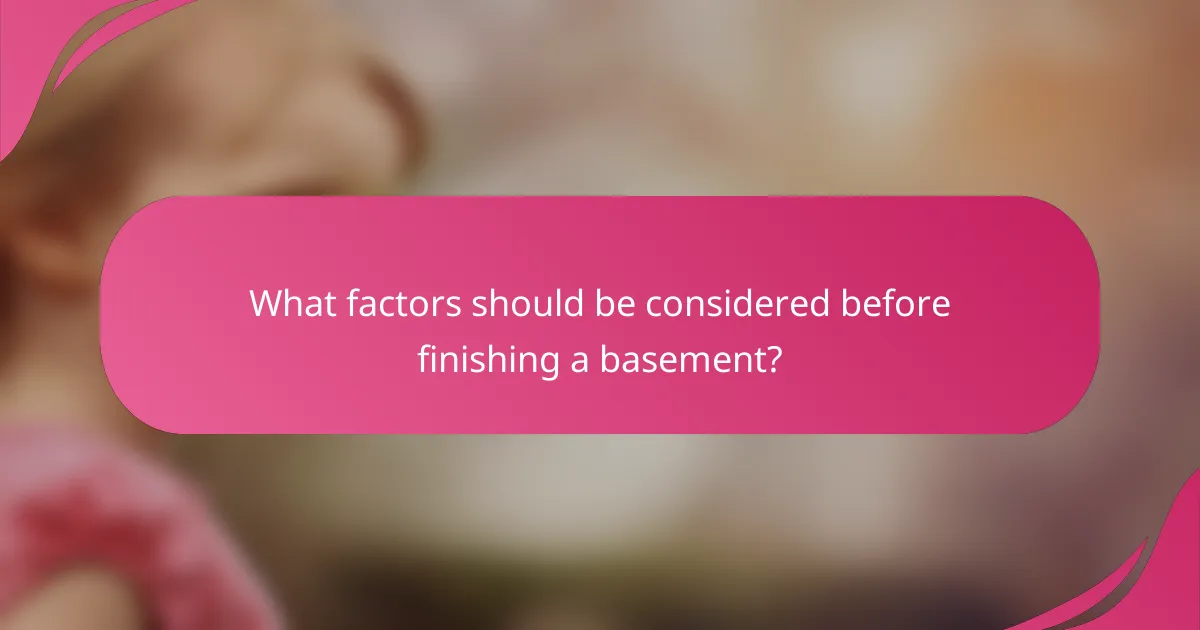
What factors should be considered before finishing a basement?
Before finishing a basement, it’s essential to evaluate local building codes, potential moisture issues, and overall design plans. These factors will significantly influence the project’s feasibility, safety, and comfort.
Local building codes and permits
Understanding local building codes and obtaining the necessary permits is crucial before starting a basement finishing project. These regulations ensure that the work meets safety standards and can vary significantly by municipality.
Check with your local building department to determine what permits are required for your project. Typically, you may need permits for electrical, plumbing, and structural changes, which can cost anywhere from a few hundred to several thousand dollars depending on the scope of work.
Moisture and waterproofing issues
Moisture control is vital when finishing a basement, as excess humidity can lead to mold growth and structural damage. Assess the current moisture levels and consider installing a waterproofing system if necessary.
Common solutions include applying sealants to walls, installing sump pumps, and ensuring proper drainage around the foundation. It’s advisable to conduct a thorough inspection and possibly consult a professional to address any existing moisture problems before proceeding with the finishing work.
